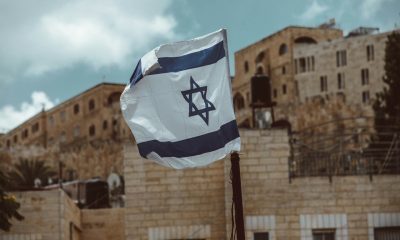אפריקע
אי.יו. ערדזשד צו העלפֿן # טאָגאָ צו באַזייַטיקן 'מאַסקע פון דעמאָקראַסי'


The international community, including the EU, has been urged to help Togo rid itself of its “mask of democracy”. The plea was made by Nathaniel Olympio, who heads Parti Des Togolais, one of the main opposition parties in the country, during a visit to Brussels.
He wants the EU to put pressure on the long-standing regime that has ruled the country since the 1960s to improve living conditions and democracy.
Speaking at a news conference, he said: “We cannot do this on our own. We need the help of others.”
Togo, with a population of 7.5 million and a potentially crucial gateway to the rest of Africa, held local elections on 13 June, the first municipal elections since 1987.
The next presidential elections are due to take place in 2020 and Olympio says his party may be one of up to six which may take part in a bid to oust the ruling Gnassingbe family which, he says, has reduced his homeland to a state where people “feel like prisoners in their own country”.
He says past elections have been a “foregone conclusion” partly due to the inability of many people in the country to vote.
The reason for this, he says, is that 85% of Tongo citizens do not have an ID card while 75% do not possess a birth certificate. “Even the mobile phone ownership is higher amongst young people,” he said.A recent poll showed that out of nearly 200 countries people in Togo were said to be the most unhappy in the world. It is the third time in a row that it has finished bottom of the poll.
“People are just fed up with this and want change,” he told reporters.
The country's geographic location at the heart of the sub-region makes it a natural hub for access to the West African market of 350 million people. Togo is West Africa's leading financial centre and a strategic West African services centre with a young, dynamic, highly skilled, and abundant pool of labour.
The country has made modest progress in reducing poverty in recent years, and poverty levels remain high with women more likely to be living in poverty than men.
“Despite its potential, Togo is a fragile state,” said the 60-year-old.
The World Bank Systematic Country Diagnostic identifies weak governance as the fundamental barrier to reducing poverty while conflicts of interest and a lack of accountability to citizens have resulted in weak government effectiveness in formulating and implementing policies that enable private economic activity, said Olympio.
The country remains the target of criticism over its human rights record, endemic corruption, political governance and other examples of bad governance.
“Implementation of political reforms has been slow and little progress in democratic process and in boosting living standards has fuelled social and political tensions over the past years, including strikes by different sectors,” he said.
He noted that Eyadema Gnassingbe ruled the country for 38 years until his death in 2005. His son Faure Gnassingbe has been ruling the country for 15 years, in other words “52 years for the same family”.
The country is now marked by “political turmoil” with daily street protests throughout Togo taking place since 2017.
The security forces have denied protest permits and shut down civil gatherings while severe restrictions on public protests and freedom of expression remain in place in Lomé. Community organisers and human rights activists are still in jail while political opponents and opposition leaders are forced to exile, he pointed out.
He said: “The unending political crisis in Togo, has taken a new dimension with the current electoral process prolonging the current regime’s grip on power and for elongating their stay in power.”
Olympio, who was educated and worked in Paris before returning to Togo in 2014 to form the Parti Des Togolais, said: “Any full-blown crisis in Togo can be expected to create a serious regional security and humanitarian crisis similar to those following past conflicts in Mali with a possible influx of refugees to neighbouring countries and upsurge of security concerns in the region.”
He added: “Unless things improve, terrorism, which is taking root in the north of the country, will spread and that could have explosive consequences for the whole region.
“Not giving the benefits of Togo citizenship to Togolese nationals is definitely not a good way to blunt the prospect of home-grown terrorism and to fostering integration and community cohesion.
“This together with the democratic deficiency prevailing in the country increase the population frustration with the current political regime, and could reduce the population cooperation level with the security forces to overcome insurgency. It is crucial to recognise that effective counter-terrorism measures and the protection of human rights for all and the rule of law are not conflicting goals, but complementary and mutually reinforcing.”
“Citizenship is necessary for an all-inclusive participation in the fight against terrorism, driving the citizen-response mechanism and showing solidarity with our soldiers who are working with patriotism putting themselves in harm’s way to fight insurgency.”
He said he had come to Brussels to “awaken the consciousness and conscience of the Togolese people” and the rest of the international community “on the need to collectively put an end to the menace of terrorism and to start by ensuring that all Togolese feel part of their country.”
The message, he said, is that “It is incumbent on the international community to address the situation in Togo, starting with condemning the harassment, detention, and gunfire aimed at unarmed protesters, in addition to internet blackouts and other abuses, as well as making the ruling regime quickly resolve Togo’s identity issue.”
He wants to see "effective"observers deployed at the elections this month and next year so as to help combat fraud and improve transparency.
He added: “The current protests in Hong Kong have highlighted concerns about what is happening there. We want the world to know what is happening in Togo. There is a mask of democracy but that is all it is, a mask."
שער דעם אַרטיקל:
-

 franceקסנומקס טעג צוריק
franceקסנומקס טעג צוריקפראנקרייך גייט פארן נייעם אנטי-קולט געזעץ קעגן סענאט'ס אפאזיציע
-

 קאָנפערענסעסקסנומקס טעג צוריק
קאָנפערענסעסקסנומקס טעג צוריקנאַשאַנאַל קאָנסערוואַטיוועס וואַו צו פאָרזעצן מיט בריסל געשעעניש
-

 סביבהקסנומקס טעג צוריק
סביבהקסנומקס טעג צוריקSIBUR פּלאַנז צו ריסייקאַלד אַרויף צו 100,000 טאָנס פון פּלאַסטיק וויסט פּער יאָר
-

 נאַטאָקסנומקס טעג צוריק
נאַטאָקסנומקס טעג צוריק'קיין גוואַלד אָדער ינטימידיישאַן' קענען פאַרשפּאַרן אוקריינא ס נאַטאָ דרך























